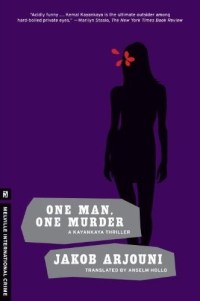One Man, One Murder by Jakob Arjouni
 Thursday, June 23, 2011 at 10:31AM
Thursday, June 23, 2011 at 10:31AM 
Frist published in Germany in 1991; published in English by Melville House on June 7, 2011
Wikipedia tells me that Jakob Arjouni is a German writer and that One Man, One Murder (originally published in 1991 as Ein Mann, ein Mord) is the third of four novels featuring the Frankfurt detective Kemal Kayankaya. I haven't read the first two but I don't think my lack of familiarity with the series hindered my enjoyment of this one.
The story takes place in 1989. In the tradition of noir private eyes, Kayankaya is wondering how to pay the rent on his ratty office when a client walks through the door. Manuel Weidenbusch has fallen in love with a Thai woman, has paid her debt to release her from the "club" that employs her, and has paid an additional sum for a forged passport to keep her in the country after her visa expires. The phony passport purveyor has apparently kidnapped Sri Dao Rakdee; hence Weidenbusch's need for Kayankaya's services.
Kayankaya's investigation takes him to the brothel where Sri Dao Rakdee was working off her debt, to unhelpful immigration authorities, to a refugee organization, to a cabaret, to jail, and to a dead body. Before bringing the investigation to a satisfying conclusion, Kayankaya encounters, and makes fun of, a number of racial purists who view the good old days of German nationalism with nostalgia. Although he's a German citizen, Kayankaya's parents are Turks and he's viewed with suspicion by many of his fellow Germans. Kayankaya has a cheeky, anti-authoritarian attitude that shines when he confronts police officers, immigration officials, and paper-pushers in the civil service.
The novel delivers an intelligent take on illegal immigration in Germany without being preachy. Some readers object to political discussions in novels; those readers might want to give this one a pass. Politics is overshadowed by plot, however, and although he's an advocate for the underdog and takes care of his friends, Kayankaya isn't what you'd call a liberal do-gooder. He fits the mold of the anti-hero: he's irreverent and hard-headed and doesn't have any great belief in justice (at least, not of the law-and-order variety), yet he has his own kind of honor, a dogged determination to dig up the unpleasant truths that corrupt officials and illicit businessmen would prefer to keep buried.
Lesser writers should take lessons from Arjouni. His prose is efficient; no words are wasted in this brief novel. He avoids clichés and his dialog is both realistic and acid-tinged. Still, Arjouni isn't so minimalist that he forgets the necessities of good fiction: he creates atmosphere by painting colorful images of a drab city, and he gives his characters personality without resorting to stereotypes. He keeps his intelligent plot moving at a brisk pace. Arjouni reminds me of Joe Gores, an American writer of detective fiction whose work exhibits the same admirable qualities. Arjouni adds a bit of social realism to the mix, giving One Man, One Murder an added dimension that I appreciated. Fans of hard-boiled detective fiction should enjoy this novel as much as I did.
RECOMMENDED
 TChris |
TChris |  Post a Comment |
Post a Comment |  Germany,
Germany,  Jakob Arjouni,
Jakob Arjouni,  Recent Release,
Recent Release,  mystery in
mystery in  Thriller
Thriller
Reader Comments